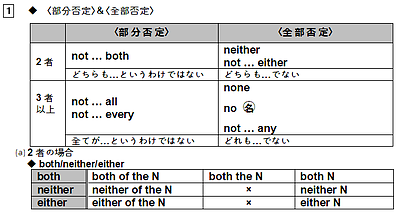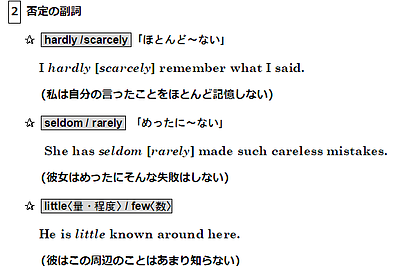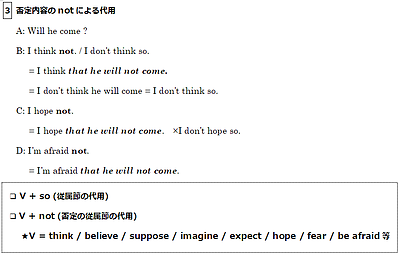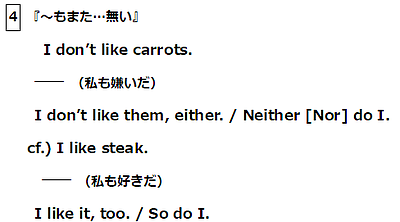
英検1級取得者によるオンライン個別指導のプロ
英語パーソナルジム HIET(ヒート)/ High Intensity English Training
- お電話での
お問い合わせ - 090-3825-5237
コラム
英文法5分ドリル【否定】①
2023年12月15日
Proust and James are great novelists, and ( ) is easy to read.
① both
② all
③ none
④ neither
neither 「どちらも~ない」《3人称単数扱い》
『タバコも酒もやらない』
I don’t smoke, and neither do I drink.
I don’t smoke, and I don’t drink, either .
I neither smoke nor drink.
『君も僕も間違っていない』
× Neither you nor I are wrong.
◎ Neither you nor I am wrong.
『僕は泳げない』『私もです』
× I cannot swim. Neither I can.
◎ I cannot swim. Neither can I.
正解:④
「プルーストとジェイムスは偉大な作家である。どちらも簡単には読めない」
Proust and James are great novelists, and neither is easy to read.
Proust and James are both renowned novelists, yet neither of their works is easy to read.
While both Proust and James are exceptional novelists, neither of their writings lends itself to easy comprehension.
Though Proust and James are acclaimed for their novels, neither author produces easily digestible prose.
“Are your parents traveling with you?” “No, not ( ); Mother only.”
① each
② one
③ either
④ both
⒜ 2者の〈部分否定〉&〈全部否定〉
〈部分否定〉
☆ not ... both
☆ both ... not
〈全部否定〉
☆ neither
☆ not ... either
〈部分否定〉
☆ I don’t know both of them.
彼らの二人とも知っているわけではない。
〈全部否定〉
☆ I don’t know either of them.
彼らのどちらも知らない。
〈全部否定〉
☆ I know neither of them.
彼らのどちらも知らない
〔参考〕 *Nは名詞を表す

〈部分否定〉
☆ Not all of the passengers were rescued.
全ての乗客が助かったわけではない。
〈部分否定〉
☆ Not every passenger was rescued.
全ての乗客が助けられたわけではない。
〈全部否定〉
☆ None of the passengers were rescued.
救出された乗客はいなかった。
〈全部否定〉
☆ No passengers were rescued.
救出された乗客はいなかった。

〈部分否定〉
An interesting book is not necessarily a good book.
面白い本が必ずしも良い本とはかぎらない。
〈全部否定〉
An interesting book is never a good book.
面白い本は決して良い本ではない。
<not…both>〔部分否定〕
正解:④
「ご両親も一緒に旅行するの」
「いや,母親だけだよ」
“Are your parents traveling with you?”
“No, not both; Mother only.”
"Are both of your parents accompanying you?"
"No, only my mother."
"Do both your parents travel with you?"
"No, just my mother."
"Are both your parents coming along?"
"No, only my mother is."
I can’t read this book ( ) learning a lesson.
① but
② without
③ with
④ though
<never [can’t ] …without doing>
『…すれば必ず ~ する』《二重否定》
It never rains but it pours.
=It never rains without pouring.
(降れば,どしゃ降り)〔格言〕
*不幸なことは続いて起こるものであるという趣旨
Scarcely a day passed but I met her.
=Scarcely a day passed without meeting her.
「私が彼女に会わない日は,ほとんど一日もなかった」
I never [cannot] look at this picture without being reminded of my late father.
=Whenever [Every time] I look at this picture, I am reminded of my late father.
=I never [cannot] look at this picture but [that] I am reminded of my late father.
「この絵を見ると亡くなった父のことを思い出す」
正解:②
「本を読めば必ず教訓を得る」
I can’t read this book without learning a lesson.
I can't peruse this book without gaining insight.
Reading this book invariably leads to me learning something.
Each time I read this book, I glean a valuable lesson.
It is said that the poor are not ( ) unhappy.
① always
② hardly
③ seldom
④ sometimes
<not+100%>を表す言葉で
「全てが~とは限らない」
という例外を認める否定表現を
《部分否定》と言う。
これに対して
「全てが(決して)~でない」
のような例外を認めない否定を
《全部否定》などと言う。
本問では
<not always>「いつでも~とは限らない」
を用いる。
② hardly
③seldom
は「ほとんど~ない」という否定的意味の副詞で
直前の not と合わない。
正解:①
「貧しい人がいつでも不幸せとはかぎらないと言われている」
It is said that the poor are not always unhappy.
There's a belief that not all individuals who are financially disadvantaged are unhappy.
Contrary to popular belief, unhappiness isn't a constant among those who are impoverished.
The notion exists that not all poor people experience perpetual unhappiness.
“Who won the first prize, Paul or John?”
“( ) of them did. George did.”
① None
② No one
③ Neither
④ Either
Neither of them did.
=They didn’t win the prize either.
neither は bothに対応する否定語で対象は常に2つ。
それ以上のときには none を用いる。
正解:③
「一等賞を取ったのは誰,ポールかジョン?」
「どちらでもないよ。ジョージだよ」
“Who won the first prize, Paul or John?”
“Neither of them did. George did.”
"Did Paul or John secure the first prize?"
"No, it was George who won."
"Was the first prize won by either Paul or John?"
"No, it was actually George who won."
"Did either Paul or John win the first prize?"
"No, George emerged as the winner."
( ) brothers do not like carrots.
① Both my
② My both
③ The both
④ Both two my
『2人の娘は両方とも結婚している』
× My both daughters are married.
*bothはmyの前に置くべき
◎ Both my daughters are married.
◎Both of my daughters are married.
◎ My daughters are both married.
正解:①
「僕の兄弟は両方ともにんじんが嫌いだ」
Both my brothers do not like carrots.
Neither of my brothers has a liking for carrots.
It's not the case that both of my brothers enjoy eating carrots.
Both of my brothers share a dislike for carrots.
All horses are animals, but not ( ) animals are horses.
① any
② some
③ all
④ every
④はevery+単数名詞の形にすべきで失格。
<not+all[every] >
「全て~なわけではない」
〔部分否定〕
I don’t know everything about him.
〔全部否定〕
I don’t know anything about him.
(a)「彼の事をなんでも知っているわけでない」
(b)「彼について何も知らない」
正解:③
「全ての馬が動物である。しかし,すべての動物が馬というわけではない」
All horses are animals, but not all animals are horses.
While every horse is an animal, not every animal is a horse.
All horses belong to the category of animals, but other animals exist beyond horses.
Every horse falls under the classification of animals, but the animal kingdom extends beyond horses.
( ) do we hear such a beautiful chorus from church choirs.
① Almost
② Seldom
③ Not
④ Rather
空所の後ろの文構造に注目。do(助動詞) S V になっており,文頭に否定語が出たことによる強制倒置であ
ることがわかる。③も否定語だがNot do we hear…と言わない。Never do we hear…なら可。
『ほとんど…ない』 〈程度〉
hardly [-]
scarcely [-]
barely [+]
『めったに…ない』 〈頻度〉
seldom
rarely
形容詞の little, few「ほとんど…ない」は〈数量〉
正解:②
「教会の聖歌隊のあんな美しいコーラスはめったに聞けない」
Seldom do we hear such a beautiful chorus from church choirs.
Rarely do we encounter such a stunning chorus from church choirs.
It's infrequent to hear such a beautiful choir performance from church choirs.
Church choirs seldom deliver such a beautiful chorus.
We can’t read an interesting book for an hour ( ) being the better and happier for it.
① without
② instead of
③ owing to
④ rather than
<cannot[never]…without doing ~>
「~ しないで…することはない」
▸「…すると必ず~する」
書き換えると,
It is impossible for us to read an interesting book for an hour without being better and happier for it.
Nobody can read an interesting book for an hour without being better and happier for it.
正解:①
「面白い本を1時間読めば,必ずそれだけ爽快で幸福感が得られる」
We can’t read an interesting book for an hour without being the better and happier for it.
Whenever we spend an hour reading an engaging book, we always end up feeling improved and happier.
Reading an intriguing book for an hour inevitably leads to feeling better and happier.
It's impossible to read a captivating book for an hour without experiencing improvement and happiness.
We can’t thank you ( ) much for your kind help. We owe our success to you.
① very
② too
③ so
④ as
<cannot ~ too much>
「 ~ してしすぎることはない」
『なんとお礼を言ったらよいのやら』
I can’t thank you enough.
=I can’t thank you too much.
『その重要性はいくら強調してもしすぎでない』
You cannot emphasize its importance too much.
You cannot overemphasize its importance.
It is impossible to emphasize its importance too much.
正解:②
「あなたの親切な助けにお礼の言葉もありません。我々の成功はあなたのおかげです」
We can’t thank you too much for your kind help. We owe our success to you.
No amount of gratitude can adequately express our appreciation for your kind assistance. Our success is owed to you.
There's no limit to how much we appreciate your kind help, which has been instrumental in our success.
We cannot overstate how grateful we are for your kind assistance; our success is directly attributed to you.
【音読基本英文】
「プルーストとジェイムスは偉大な作家である。どちらも簡単には読めない」
Proust and James are great novelists, and neither is easy to read.
Proust and James are both renowned novelists, yet neither of their works is easy to read.
While both Proust and James are exceptional novelists, neither of their writings lends itself to easy comprehension.
Though Proust and James are acclaimed for their novels, neither author produces easily digestible prose.
「ご両親も一緒に旅行するの」
「いや,母親だけだよ」
“Are your parents traveling with you?”
“No, not both; Mother only.”
"Are both of your parents accompanying you?"
"No, only my mother."
"Do both your parents travel with you?"
"No, just my mother."
"Are both your parents coming along?"
"No, only my mother is."
「本を読めば必ず教訓を得る」
I can’t read this book without learning a lesson.
I can't peruse this book without gaining insight.
Reading this book invariably leads to me learning something.
Each time I read this book, I glean a valuable lesson.
「貧しい人がいつでも不幸せとはかぎらないと言われている」
It is said that the poor are not always unhappy.
There's a belief that not all individuals who are financially disadvantaged are unhappy.
Contrary to popular belief, unhappiness isn't a constant among those who are impoverished.
The notion exists that not all poor people experience perpetual unhappiness.
「一等賞を取ったのは誰,ポールかジョン?」
「どちらでもないよ。ジョージだよ」
“Who won the first prize, Paul or John?”
“Neither of them did. George did.”
"Did Paul or John secure the first prize?"
"No, it was George who won."
"Was the first prize won by either Paul or John?"
"No, it was actually George who won."
"Did either Paul or John win the first prize?"
"No, George emerged as the winner."
「僕の兄弟は両方ともにんじんが嫌いだ」
Both my brothers do not like carrots.
Neither of my brothers has a liking for carrots.
It's not the case that both of my brothers enjoy eating carrots.
Both of my brothers share a dislike for carrots.
「全ての馬が動物である。しかし,すべての動物が馬というわけではない」
All horses are animals, but not all animals are horses.
While every horse is an animal, not every animal is a horse.
All horses belong to the category of animals, but other animals exist beyond horses.
Every horse falls under the classification of animals, but the animal kingdom extends beyond horses.
「教会の聖歌隊のあんな美しいコーラスはめったに聞けない」
Seldom do we hear such a beautiful chorus from church choirs.
Rarely do we encounter such a stunning chorus from church choirs.
It's infrequent to hear such a beautiful choir performance from church choirs.
Church choirs seldom deliver such a beautiful chorus.
「面白い本を1時間読めば,必ずそれだけ爽快で幸福感が得られる」
We can’t read an interesting book for an hour without being the better and happier for it.
Whenever we spend an hour reading an engaging book, we always end up feeling improved and happier.
Reading an intriguing book for an hour inevitably leads to feeling better and happier.
It's impossible to read a captivating book for an hour without experiencing improvement and happiness.
「あなたの親切な助けにお礼の言葉もありません。我々の成功はあなたのおかげです」
We can’t thank you too much for your kind help. We owe our success to you.
No amount of gratitude can adequately express our appreciation for your kind assistance. Our success is owed to you.
There's no limit to how much we appreciate your kind help, which has been instrumental in our success.
We cannot overstate how grateful we are for your kind assistance; our success is directly attributed to you.
要点整理【否定】

〈部分否定〉
I don’t know both of the parents.
(私は両親を両方知っているわけでない)
〈全部否定〉
I don’t know either of the parents.
=I know neither of the parents.
(私は両親どちらも知らない)
⒝ 3者以上の場合
〈部分否定〉
Not all of the passengers were rescued.
(全ての乗客が救出されたわけではない)
〈部分否定〉
Not every passenger was rescued.
(全ての乗客が救出されたわけではない)
〈全部否定〉
None of the passengers were rescued.
(救出された乗客はいなかった)
〈全部否定〉
No passengers were rescued.
(救出された乗客はいなかった)
〈部分否定〉
I’m not always at home on Sundays.
(私は日曜日にいつも家にいるわけではない)
〈全部否定〉
I’m never at home on Sundays.
(私は日曜日には家にいない)


5 《潜在否定》慣用表現 Best 10
⑴ anything but 「…どころではない」
He is anything but a musician.
(彼はミュージシャンどころではない)
⑵ the last 名 to do/関係詞節… 「最も…しそうにない~」
He is the last person to tell a lie.
(彼は最も嘘をつきそうにない人間だ)
⑶ far from
「…どころではない」
The result is far from satisfactory.
(その結果は満足に遠く及ばない)
⑷ beyond/above
「…を超越している」
He is above stealing.
(彼は盗みをするような人間ではない)
⑸ never fail to do
「…必ず~するのを忘れない」
Never fail to go to wash your hands before going for a drive.
(ドライブに行く前に必ず手を洗ってね)
⑹ free from
「…から開放されている」
No one is free from faults.
(人はだれでも欠点を持っている)
⑺ not …in the least
「まったく…ない」
This book is not in the least easy.
(この本はまったく簡単ではない)
⑻ by no means
「決して…ない」
She is by no means stupid.
(彼女は決して馬鹿ではない)
⑼ nothing but
「…以外の何者でもない」
Don’t believe what he says. He is nothing but a liar.
(彼の言うことを信じないで。彼は嘘つきだ)
⑽ do nothing but do
「…ばかりしている」
He does nothing but worry every day.
(彼は毎日心配ばかりしている)
6 〈倒置〉 否定語・only・well +助+S V
I little dreamed of seeing him again.
➪ Little did I dream of seeing him again.
(彼に再び会えるとは夢にも思っていなかった)
I have never seen her since then.
➪ Never have I seen her since then.
(それ以来,彼女には一度たりとも会っていない)
以下類例。
Only then did he realize it.
(彼はそのときはじめてそれを悟った)
Not only does she dislike him but she despises him.
(彼女は彼を嫌っているばかりでなく軽蔑している)
Hardly had he gone when they began to speak ill of him.
(彼が帰るとすぐ彼らは彼の悪口を言い始めた)
今後も英語学習に関わる情報、体験談を発信していきます。

関連するコラム
- 英検2級・大学入試《英単語フロージョン》⑧ 2024-01-29
- TOEIC 問題回収はヤメテ !! 韓国で過去問購入可能だけれど 。。。 2024-04-30
- 『英語喉』は発音ではなく「発声・肉体の使い方」である論 ! 2024-04-13
- 【スピーキング全捨て】という『スピーキング学習戦略』 2024-05-23
- 英検1級【ライティング&面接】★ 予想問題 ★ 的中可能論 2024-04-07
コラムのテーマ一覧
カテゴリから記事を探す
TEX 二井原プロへの
お問い合わせ
マイベストプロを見た
と言うとスムーズです
勧誘を目的とした営業行為の上記電話番号によるお問合せはお断りしております。








